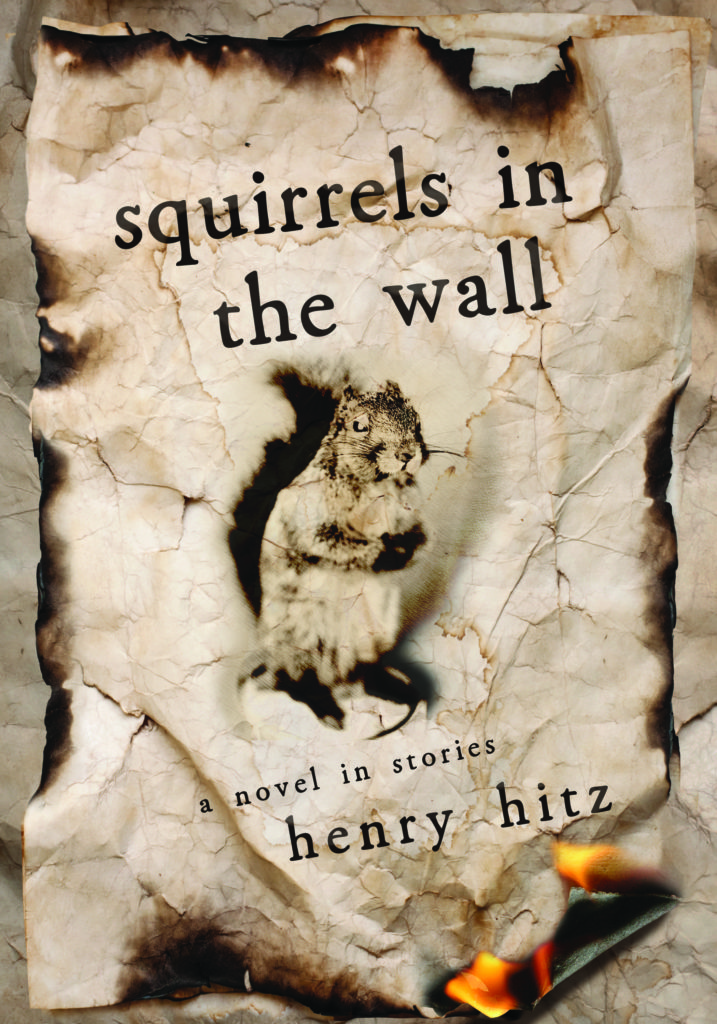Sometimes I have to explain that writers are assholes: we steal the identities of people we know, and we twist them around to suit the narrative. To the people (not many) who strenuously object, I say you know, it’s an honor to be in my book.
Henry Hitz – 7 November 2019
The Back Flap
Squirrels in the Wall—a novel told in stories by a collection of interspecies voices—presents a unique and darkly hilarious blend of human and animal perspectives in a single setting on a Wisconsin lake. The stories provide a kaleidoscope of heartbreak among both human and animal characters as they confront abuse and death.
“They call me Herziger, but my real name is Woof,” one of the stories opens. “They call me a dachshund, but in reality, I am just a dog. I live with my mother among a pack of wild humans in a big house on a lake.” In the second story, “Squirrels in the Wall,” Herzie’s “human,” Barney Blatz, experiences a fire in that house when he is just four. The stories follow Barney from infancy to death, tracing the epic, ongoing conflict between him and Father—a bumbling tyrant guilty of shocking abuse but also capable of poignant redemption.
On this rollicking journey, we meet a suicidal toad, a cat, two mice, a bee, Grandfather’s ghost, and a turtle who possesses Barney in a climactic tale of environmental activism gone awry. Other stories reflect the points of view of Barney’s mother, sister, and older brother; together, they construct a collage of spectacular family dysfunction—and of healing love.
About the book
What is the book about?
Squirrels in the Wall is about the humanity of animals and the animality of humans. It’s a novel told in stories by a collection of interspecies voices that presents a unique and
darkly hilarious blend of human and animal perspectives in a single setting on a Wisconsin lake. The stories provide a kaleidoscope of heartbreak among both human and animal characters as they confront abuse and death.
When did you start writing the book?
The first story was written in 1985. I wrote three other novels (two published) between then and when I finished Squirrels in 2019.
How long did it take you to write it?
So I guess you could say it took thirty-four years, but the concentrated efforts of compiling and integrating the stories into a narrative arc took about three years.
Where did you get the idea from?
My first novel was about a man raised by baboons in Kenya and I created a whole baboon universe with a language, culture, and philosophies. In that novel and in the subsequently written stories that became Squirrels I turned the “scientific” aversion to anthropomorphism on its head, asking the question, what if animals were exactly like us in every way except those ways that they were self-evidently different, such as walking on two legs and writing novels [Who knows, maybe ants write novels on grains of sand with their pee].
Were there any parts of the book where you struggled?
My first thought is all of it, but the places where I particularly struggled were in linking the stories, many of which were written independent of the idea that they would be part of a novel. For example, one of the stories, “Term Life,” was originally set in California, but I moved it to Wisconsin to make it fit with the other stories. Another challenge was dealing with family and others upon whom many of the characters are loosely based. Some people objected to how they were “portrayed” but I simply quoted to them what it says on the copyright page: “Any resemblance to actual persons, living or dead, is entirely coincidental.”
What came easily?
The animal voices came easily. Imagining the point of view of a toad, a bee, a dog, a ghost, a “country” mouse and a “city” mouse, a squirrel, a turtle colony was exciting to me. Imagining death was also fun.
Are your characters entirely fictitious or have you borrowed from real world people you know?
It’s an autobiographical novel, so all the characters are loosely based on real world people. As I said above, this has been somewhat of a challenge. Sometimes I have to explain that writers are assholes: we steal the identities of people we know, and we twist them around to suit the narrative. To the people (not many) who strenuously object, I say you know, it’s an honor to be in my book.
We all know how important it is for writers to read. Are there any particular authors that have influenced how you write and, if so, how have they influenced you?
The writer that has influenced me most has been Franz Kafka, Metamorphosis certainly but also Report to an Academy about an academic lecture by an ape. Richard Adams, especially Watership Down. I share a certain sensibility with Kurt Vonnegut, particularly around tragicomedy.
Do you have a target reader?
I don’t have a target reader when I’m writing except perhaps members of the writer’s group I’m working with. When I finish a book, as a part of marketing it, I do try to identify a target audience. In the case of Squirrels, animal lovers, people who live in the lake country region, readers of family drama.
About Writing
Do you have a writing process? If so can you please describe it?
For many years I was a weekend writer, but now that I’m retired, I try to write every day, or at least work on my writing – sometimes marketing, sometimes editing. I often meditate before writing something new (sometimes 420 enhanced).
Do you outline? If so, do you do so extensively or just chapter headings and a couple of sentences?
I don’t do outlines because I rarely know what will happen. I let the characters decide. I make up some characters and set them on a journey with a vague destination or plot and see what happens. When I get to the three-quarter point, I might outline the denouement.
Do you edit as you go or wait until you’ve finished?
I don’t edit extensively until I’m finished with a draft. I read 1200 word sections to my writers’ group every week and then incorporate the feedback for that section that makes sense.
Did you hire a professional editor?
For Squirrels, I did hire a professional developmental editor, and it was extremely helpful.
Do you listen to music while you write? If yes, what gets the fingers tapping?
I do listen to music when writing. What kind depends on my mood. I listen to Bill Evans or Nina Simone channels on Pandora. Sometimes I listen to meditation music on YouTube.
About Publishing
Did you submit your work to Agents?
I do pitch to agents at writer’s conferences, but I haven’t found anyone interested in representing my work yet. I will keep trying.
What made you decide to go Indie, whether self-publishing or with an indie publisher? Was it a particular event or a gradual process?
I self-published my first novel, White Knight, a midquel to Squirrels with many of the same characters (human, not animal). I went that route because I couldn’t get an agent, though I queried several hundred. For Squirrels, I went the hybrid route with SparkPress and I’m pleased with the process so far. Their catalogue is curated, and their staff is highly skilled, though I do have to pay for many of their services.
Did you get your book cover professionally done or did you do it yourself?
For White Knight, I had a graphically skilled friend do two different covers, both of which worked for me. For Squirrels, I had the publisher do it.
Do you have a marketing plan for the book or are you just winging it?
I took out a line of credit on my house to pay for an in-house publicist for Squirrels. The got me this and other interviews, two readings so far, and a high-quality review. They are still implementing the extensive marketing plan.
Any advice that you would like to give to other newbies considering becoming Indie authors?
Consider hybrid if you can afford it. There’s other services like Bubblish that I hear good things about. They provide a menu of services in marketing. Definitely go through Ingram and make sure your book is returnable if you want bookstores to stock it. Plan on spending a lot of time on marketing.
About You
Where did you grow up?
I grew up on a lake in Wisconsin, the precise setting of Squirrels in the Wall.
Where do you live now?
I live in Oakland, California
What would you like readers to know about you?
Here’s my official bio: Henry Hitz taught preschool for thirty years. He divides his time between Oakland, California―where he lives with his wife, son, two sisters, two dogs, and a cat―and San Miguel de Allende, Mexico, where he first observed how the boattailed grackles and local teenagers all gather at the central jardin at sunset for precisely the same reason. He has published stories in Cube Literary Magazine, Magnolia Review, Scarlet Leaf Review, and Moonfish. His first novel, Tales of Monkeyman, won the Walter Van Tilburg Clark Prize. His novel White Knight was published in January 2016 by Wordrunner Press and reissued last year for the fortieth anniversary of Jonestown. He blogs at HenryHitz.com.
What are you working on now?
I’m working on a novel called Thoth narrated by the Egyptian god of writing. As messenger to the gods, he has become alarmed at the human trajectory and wakes up his hibernating colleagues from polytheistic cultures to try to undo the damage done by Jehovah and his 2000-year hegemony. It’s a political satire similar to Animal Farm but with newly awakened indigenous gods rather than animals.
End of Interview:
For more from Henry, visit his website.
Get your copy of Squirrels in the Wall from Amazon US or Amazon UK.


